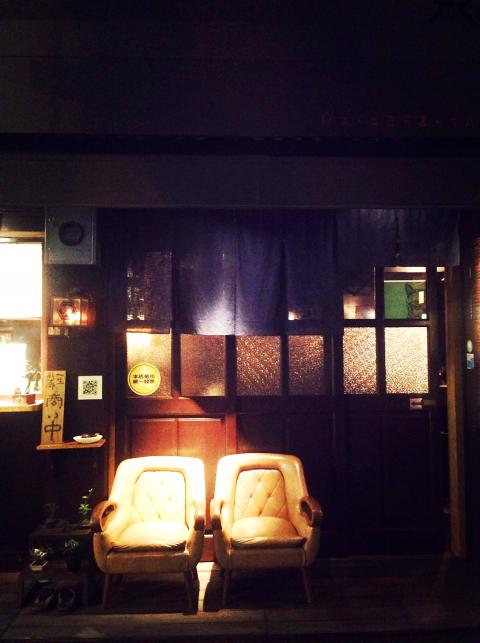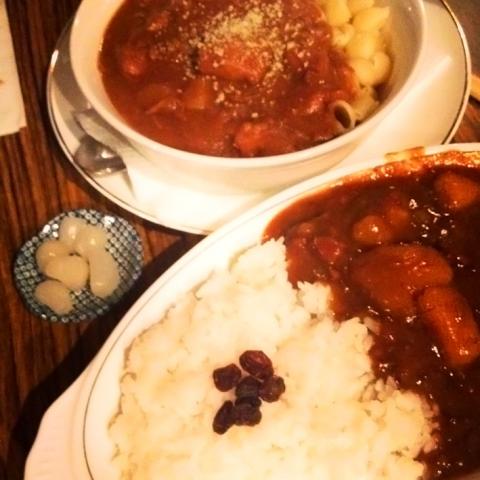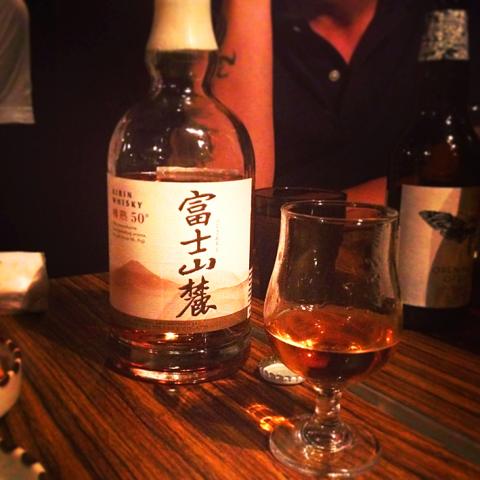From the owner of Cafe Kuroshio (咖啡黑潮) and Caffe Libero (咖啡小自由) comes Torarakuya-Taipei (寅樂屋). This time, coffee connoisseur Kao Chen-yu (高振御) waves his magic wand and transforms his parents’ modest curry joint into an old-school Japanese eatery, looking charmingly out of place in the traffic-clogged, noise-filled midtown of Taipei.
Concealed behind a row of ramshackle houses at the bustling intersection of Xinyi Road (信義路) and Guangfu South Road (光復南路), the tiny establishment emerges from a small, dark alley as a haven of rest, with warm, yellowish light shining through the glass windows. Slide open a wooden door open and you immediately feel as though you’ve stepped into an old Japanese eatery frozen in time, where both the mind and the stomach are soothed with simple, home-cooked fare and nostalgic ambiance. Inside, wood furnishings dominate the room, which is only big enough for four small tables and a two-seat bar. Vintage pendants and table lamps grace the place with sentiments of a bygone era, while the opera music heard in the background adds a touch of sophistication.
In other words, Kao once again proves his proficiency and ingenuity to capture and revive the nostalgia for a simpler time, much in the same way that he turned a 40-year-old mansion into the now popular Caffe Libero in the neighborhood surrounding Yongkang Street (永康街).

Photo courtesy of Fantasy Dining Hall
Torarakuya-Taipei specializes in only one thing — Japanese curry — and does it well. Patrons can choose the sweeter pork and chicken curry (豬雞咖哩, NT$160) or spicier beef curry (牛肉咖哩, NT$160), all of which comes served with either rice or macaroni. Like the simply delicious food prepared by your mother, the dish is a nourishing combination of the vegetables’ sweetness and tenderly cooked meat. For an extra dose of smoothness, add an egg, sunny-side up (荷包蛋, NT$20), to the curry. The small side dish of shichi fukujin pickles (福神漬, NT$15) offers mixed pickled vegetables, which is said to aid digestion.
Torarakuya-Taipei’s beverage selection includes a limited choice of beer including iKi (NT$160 and NT$180) as well as Japanese whiskey (NT$220 and NT$250 per shot). Noted for his enthusiasm for the spirit, Kao selects two types of single malt whiskey from the Nikka distilleries, one in Yoichi, Hokkaido, the other in Miyagi Prefecture, Northern Honshu, and seems eager to share his knowledge of the brew with curious diners. For those looking for good conversation, the always amicable proprietor is also a knowledgeable one to talk to about food, drink and the good life.
Another thing about Kao is that wherever he goes, there will always be good coffee brewing. For the Japanese-style eatery, the maven prepares specialties including the Iced coffee with plum wine (梅子酒冰咖啡, NT$180) and iced coffee with awamori (泡盛冰咖啡, NT$180), a type of distilled rice wine unique to Okinawa, Japan. For something sweet and children-friendly, there is a selection of hot chocolate (NT$120 to NT$150) and ice cream (NT$80 and NT$100).

Photo courtesy of Fantasy Dining Hall
Torarakuya-Taipei is a great spot to relax, enjoy a simple, delicious meal while learning one or two things about coffee, whiskey and life in general from the always amicable owner. But diners may want to bear in mind that the recently opened eatery doesn’t take reservations and is often packed during lunch and dinner rush hours.
Warning: Excessive consumption of alcohol can damage your health.

Photo courtesy of Fantasy Dining Hall

Towering high above Taiwan’s capital city at 508 meters, Taipei 101 dominates the skyline. The earthquake-proof skyscraper of steel and glass has captured the imagination of professional rock climber Alex Honnold for more than a decade. Tomorrow morning, he will climb it in his signature free solo style — without ropes or protective equipment. And Netflix will broadcast it — live. The event’s announcement has drawn both excitement and trepidation, as well as some concerns over the ethical implications of attempting such a high-risk endeavor on live broadcast. Many have questioned Honnold’s desire to continues his free-solo climbs now that he’s a

As Taiwan’s second most populous city, Taichung looms large in the electoral map. Taiwanese political commentators describe it — along with neighboring Changhua County — as Taiwan’s “swing states” (搖擺州), which is a curious direct borrowing from American election terminology. In the early post-Martial Law era, Taichung was referred to as a “desert of democracy” because while the Democratic Progressive Party (DPP) was winning elections in the north and south, Taichung remained staunchly loyal to the Chinese Nationalist Party (KMT). That changed over time, but in both Changhua and Taichung, the DPP still suffers from a “one-term curse,” with the

Lines between cop and criminal get murky in Joe Carnahan’s The Rip, a crime thriller set across one foggy Miami night, starring Matt Damon and Ben Affleck. Damon and Affleck, of course, are so closely associated with Boston — most recently they produced the 2024 heist movie The Instigators there — that a detour to South Florida puts them, a little awkwardly, in an entirely different movie landscape. This is Miami Vice territory or Elmore Leonard Land, not Southie or The Town. In The Rip, they play Miami narcotics officers who come upon a cartel stash house that Lt. Dane Dumars (Damon)

Today Taiwanese accept as legitimate government control of many aspects of land use. That legitimacy hides in plain sight the way the system of authoritarian land grabs that favored big firms in the developmentalist era has given way to a government land grab system that favors big developers in the modern democratic era. Articles 142 and 143 of the Republic of China (ROC) Constitution form the basis of that control. They incorporate the thinking of Sun Yat-sen (孫逸仙) in considering the problems of land in China. Article 143 states: “All land within the territory of the Republic of China shall